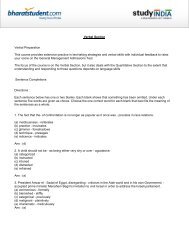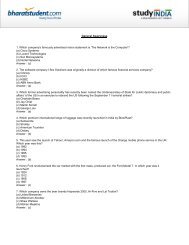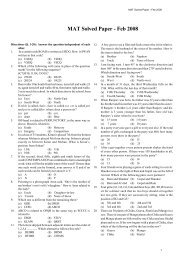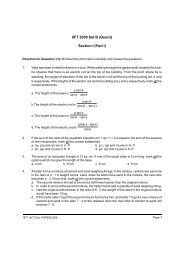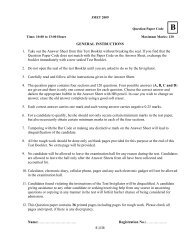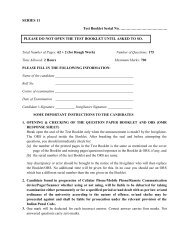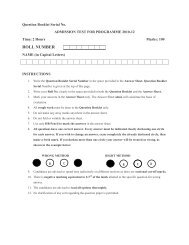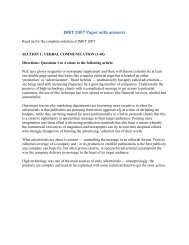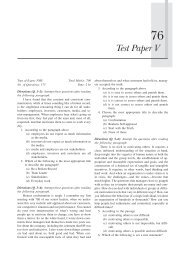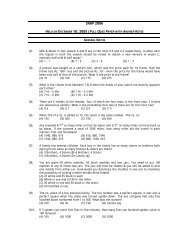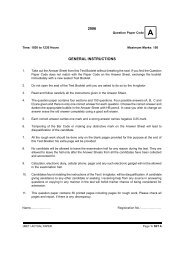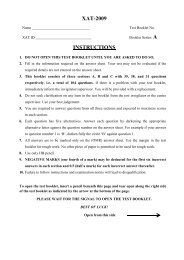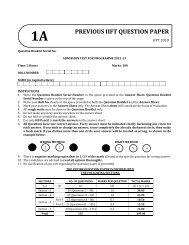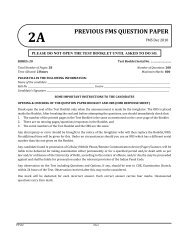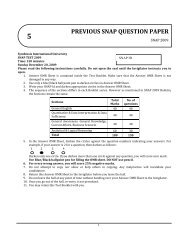ADMISSION TEST FOR PROGRAMME 2008-10
ADMISSION TEST FOR PROGRAMME 2008-10
ADMISSION TEST FOR PROGRAMME 2008-10
Create successful ePaper yourself
Turn your PDF publications into a flip-book with our unique Google optimized e-Paper software.
SECTION – A (PART – ii)<br />
The questions in this group are based on the content of the passage. After reading the<br />
passage, choose the best answer to each question. Answer all questions following the<br />
passage on the basis of what is stated or implied in the passage.<br />
PASSAGE 1:<br />
Line From the very beginning TCL (Tata Chemicals Ltd.) has successfully<br />
grown by meeting consumer requirements in a mutually beneficial way. To determine its<br />
benchmark, it uses its own ‘Customer Requirements Determination Process (CRDP)’<br />
where in it explores present and future customer requirements to enable them to<br />
(5) incorporate those in their business offerings. This process starts with<br />
listening to end-users by exploring various customer listening information sources. This<br />
information captures various expectations of customers. Next step starts with<br />
identification of segments and matching of segment wise expectations. Outcome of this<br />
exercise gives enough guidelines about new business scopes and grey areas of current<br />
(<strong>10</strong>) business practices. After validation of customer expectations through cross<br />
checking, TCL matches its internal resources and skill sets with external opportunities<br />
and threats to address attractive business avenues. Launch of Tata Kisan Sansar was an<br />
outcome of that to offer all sort of end-to-end agri solutions to farmers.<br />
Agriculture till today contributes a lot for the development of Indian economy with<br />
(15) an employment share of around 69 percent of the work force and with<br />
a contribution of near about 24 percent of the GDP of the country. Indian<br />
agriculture sector has its importance in economic growth but value addition in this<br />
sector in terms of earning capacity is decreasing because of greater income streams<br />
from industry and services sectors. The continuous expanding of the gap in per<br />
(20) capita income between the agricultural and non-agricultural sectors<br />
has huge economic and social implications and it is almost necessary to empower the<br />
farmers financially by enriching the source of income. In this backdrop, one of the<br />
motivations for TCL to start ‘Tata Kisan Sansar (TKS)’ was to ensure business by<br />
empowering agri-product producers. Again TCL felt that due to its business nature of<br />
(25) manufacturing and marketing commodities, it developed an image of a<br />
purely product centric organization. TCL’s internal research substantiated its feeling and<br />
it recognized a paradigm shift towards a customer centric organization.<br />
TCL first started ‘Tata Kisan Kendra’ in 1988, exclusive franchised retail outlets of Tata’<br />
with the objective of providing ‘one-stop agri input shop’ to the farmers. With the<br />
(30) marketing function being transferred from Rallis to Tata Chemicals, TCL<br />
used the Tata Kisan Kendras (TKKs) more extensively to market their products. It was<br />
understood by the company that the range of offerings under the TKKs offered an<br />
attractive basket of benefits to the farmers. The business model of the TKKs was based<br />
on offering a complete set of inputs to the farmer. Along with this, it also offered<br />
(35) extension services and technology inputs to help farmers plan their crops.<br />
At that time it dealt more with offering fertilizers and other inputs from those centers.<br />
Over the time it realized that the job is half done because requirement of a farmer is<br />
<strong>10</strong>



